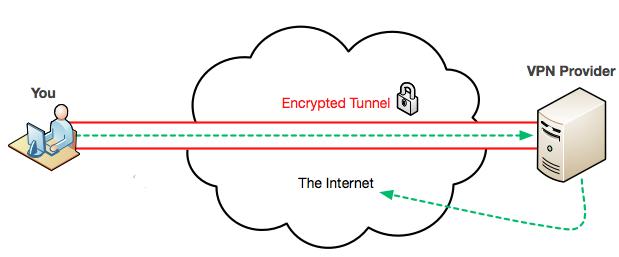Why You Need to Be Using a VPN While Travelling (and Our 2023 Picks)
In this post we’ll consider why everyone should be using a VPN when they travel abroad. It doesn’t matter whether you’re working, on holiday or backpacking across the world – a VPN for your device will be one of the best moves you can make.
What is VPN?
A Virtual Private Network or VPN is a private network that uses a public infrastructure, such as the Internet. It allows users to send and receive data across shared or public networks as if their computing devices were directly connected to the private network.
For example a VPN is often used by corporations and organisations to connect remote users and branch offices to a private, company network. That means they can use the internet to connect back to a secure network without the risks to their data and information.
For many years this was the primary role of commercial VPN services however the huge expanding role of internet has changed all that. Now millions of us will use a VPN every day for hundreds of different reasons, although mostly these fall under a few basic tasks.
What are the benefits of using a VPN during travel?
The VPN provides you with the ability to use the internet without both your personal information and privacy being exposed. Let’s have a look some of these points –
There are many benefits of using a VPN during travel, including the following:
- – It is an excellent way to prevent any potential cyber attacks.
- – It ensures that your personal data is never shared with third parties.
- – It allows you to access geo-restricted content that is restricted in certain regions.
- – It is a good way to not only protect your identity, but also to protect your personal information.
- – It allows you to bypass censorship and access content that is not available in your region.

Cyber-criminals Prey on Shared Computers and Open WiFi Networks
One of the biggest issues about using the internet when travelling is that you have to use all sorts of shared wifi access points to get online. The security and privacy of these varies hugely from place to place. After all how much do you think that coffee shop invests in IT Security when setting up their ‘free Wifi’ for you to use with your coffee? Often the owner has just set it up or had a friend install it for them.

Even with the bigger organisations there’s certainly no guarantee that your personal credentials will be secure. Hotel wifi systems are often the most risky ones to use, as there’s often inadequate security controls in place and they’re a huge target for hackers and cyber criminals too. Certainly stay clear of those ‘free shared’ computers you find in the lobby sometimes – they’re often full of spyware and malware.
When you connect using a VPN even if your network is compromised then your data is encrypted. Which means that you can login to your email, banking and other secure accounts safely. Although it should be mentioned that it doesn’t completely eradicate the risk entirely. It just gives you peace of mind and allows you to use assorted random WiFi access points relatively safely while you travel.
VPN Bypasses Geoblocks for Travellers
Geo blocks or geotargeting are arguably one of the most irritating parts of using the internet when you’re travelling. It’s the technology which controls what you can see based on your current physical location. So for example when you’re in the USA you will get US based search results. Which of course makes total sense in this context.
However, many useful and popular sites use the same technology to restrict access to specific countries. Many people don’t realise this until they start travelling and find that they can’t access a favorite website any more. It might be something they use routinely which will work perfectly fine until they connect from a different country. I found on one trip my banking site was blocked, it wouldn’t let me access my account from a different country to prevent fraud. Of course it wouldn’t let me pay my utilities bill either !
One of the most widespread users of this technology are multimedia and entertainment sites. So for example the majority of broadcasters will restrict access to their programmes to the domestic market. If you try and watch US TV sites like ABC and NBC you’ll find your access blocked if you’re physically located outside the USA.
The same goes for large entertainment sites in most other countries, the brilliant BBC iPlayer only works within the UK. Which is unfortunate as it’s one of the world’s best TV sites packed full of great TV which is completely free – alas only for those situated in the United Kingdom.
Unlock the Sites with a VPN
The following video will show you how a VPN can unlock all these blocked sites while you’re travelling. You can simply use the VPN to hide your location and use a ‘false one’ instead. So if you were locked out of your favorite TV stations while on holiday, you can simply reset your location to back home.
As you can see it’s simple to use most of these VPN services and one like NordVPN isn’t expensive at all. Most of the larger services have servers all over the world so it’s simple to change your location by selecting the one you need. Most of the sites I use require UK or US access so I generally switch between these servers. Be aware though many VPN services are blocked by some of the multimedia sites who don’t like you bypassing their blocks.
Make sure your VPN can access the service you need before investing in longer subscriptions. So if you want to watch RTE in Ireland then ensure you have an Irish proxy or VPN included in your subscription.
What are the Best VPN Services for Overseas?
There are literally hundreds of VPN services which are available and most of them do a pretty good job from the basic functionality of securing your internet connection. Creating that secure encrypted tunnel and securing your privacy should be the very minimum you expect.
Here’s a couple of the market leaders that you can check out –
- Express VPN is high-speed and has optimised servers.
- CyberGhost has easy-to-use features that make it great for beginners.
- PrivateVPN has a user-friendly interface and commitment to customer experience
All will do a fine job of keeping your internet connection safe and secure to use when travelling. However they don’t always work as well with many of the larger geo-blocked sites. For many VPN companies this isn’t a priority as it’s costly and time consuming to ensure that VPN servers aren’t blocked by specific sites.
However if accessing specific geo-blocked sites is important to you then they’re often not the best options. For example all the above have severe issues with accessing UK television sites like BBC iPlayer, which for me means that they’re not a great choice. This site is one of the prime reasons I use a VPN when travelling so it has to allow access. You may have similar sites that operate geo-blocking too which you’ll need to check.
For me two of the best sites by far for bypassing these blocks are the following –
Identity Cloaker – smaller, specialised security VPN rarely gets blocked by any site. However it only has a PC version and you have to set up manually on other devices like smartphones, tablets etc.
NordVPN – support for all your devices and works with all the blocked sites I need. Low price as long as you subscribe to the longer plans. Use the specialised media streaming services for accessing blocked sites like the BBC iPlayer. Also has a free smart DNS version too included in the subscription.
VPN Bypasses Geoblocks
We’ve mentioned this a lot, simply because for most people this is the primary reason that they use a VPN. So it’s worth explaining briefly how this actually works, it’s not difficult but understanding properly can help you choose the best VPN for international travel for you.

Every website that uses geoblocking does so by analysing your IP address when you connect. This IP address is the unique network number that every device connected to the internet has. Unfortunately you cannot really control this address and it’s really linked to the device that enables your access to the internet.
So when you walk into a coffee shop in Berlin, you’ll be assigned an IP address from the access point which you’ve connected to. Which means you’re now a German web surfer and will be treated like so by every website you visit. This is perfectly fine if you just visit German websites as you’ll have unrestricted access however if you try and access the websites based in your home country you may very well get blocked.
So the British traveller will suddenly get blocked from the BBC iPlayer when they try and watch the UK news or Match of the Day. Suddenly the US surfer finds their Netflix account is now based in Germany with lots of German films with subtitles.
Your IP Address Doesn’t Travel With You
It’s important to remember this, as you travel you’ll take on the digital nationality of your location. Often this is good if you’re looking for local resources, but more often you’ll find yourself frustrated by losing access to all the websites you rely on.
This is where the VPN comes in, because when you connect to a VPN server your IP address is changed to match this. Obviously this would be no help if you connect to a VPN based in Belarus or Saudi Arabia (unless you come from there). So today most modern VPN services will allow you to connect to any of their servers in countries all over the world.
The biggest ones have servers in loads of different countries all included in the same subscription. So there’s usually no need to search fora specific VPN for each country unless it’s a very small one.
For example –
The Best VPN for Travel to Italy
The Best VPN for Travel to France
The Best VPN for Travel to Japan
Or the Best VPN for Travel to Europe
Will all probably be the same, as if you have access to a VPN service with fast servers based in your home location that’s pretty much all you’ll need. So when you travel anywhere you can simply connect to a VPN in your home country then all your normal websites will be accessible.
If you travel abroad regularly I guarantee that investing in a VPN for work or holidays will be worth the money. What’s more they don’t generally cost much anyway, the three year subscriptions to NordVPN for example cost around 3 Euros a month, less than a coffee in most European capitals!